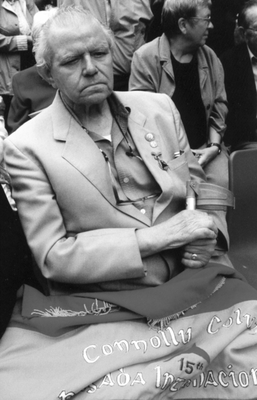Mícheál O'Riordan 1917 2006
The death of Mícheál O'Riordan, former general secretary of the Communist Party of Ireland, International Brigader and staunch advocate of the rights of the working class, marks the end of an era.
O'Riordan was born in Cork in 1917, just five days after the Bolshevik Revolution in Russia, but outlived that revolution by 15 years. His parents came from the West Cork Gaeltacht of Béal Átha 'n Ghaorthaidh, and he was deeply steeped in the history of that rebellious place – in struggles against landlordism, against English rule and against local gombeenism.
His father was a docker, actively involved in the Cork labour movement and naturally inclined to James Connolly's identification of the social struggle and the struggle for national freedom.
 himself joined Fianna Éireann, the IRA youth movement, in 1933 at the age of 16 and subsequently the IRA in Cork. He was an active participant in the fight – and fight it was – against the Blueshirts, but increasingly leant to the left of the IRA, being strongly influenced by the charismatic Frank Ryan. O'Riordan joined the Communist Party of Ireland in 1936, and responded immediately to Ryan's call for volunteers to help defend the Spanish Republic against fascism and the interference of Hitler and Mussolini. He was decorated for bravery as a soldier of the Spanish Republic, but was wounded on the Ebro front in 1938, shortly before the International Brigade was withdrawn from Spain.
himself joined Fianna Éireann, the IRA youth movement, in 1933 at the age of 16 and subsequently the IRA in Cork. He was an active participant in the fight – and fight it was – against the Blueshirts, but increasingly leant to the left of the IRA, being strongly influenced by the charismatic Frank Ryan. O'Riordan joined the Communist Party of Ireland in 1936, and responded immediately to Ryan's call for volunteers to help defend the Spanish Republic against fascism and the interference of Hitler and Mussolini. He was decorated for bravery as a soldier of the Spanish Republic, but was wounded on the Ebro front in 1938, shortly before the International Brigade was withdrawn from Spain.
Back in Ireland he threw himself into local politics, emerging as the leader of the small band of remaining Communists. But he was then interned in the Curragh when war broke out. There he worked to convince his fellow Republicans of the nature of the Spanish struggle and also learned to speak Irish from his fellow internee, Máirtín Ó Cadhain – even though his own parents had been native Irish-speakers.
Released in 1943, he won over 3,000 votes (more than 10 per cent of the vote) in a Cork by-election in 1946, but was then subject to a massive campaign of harassment which drove him out of the city.
He settled in Dublin, where he regrouped the small communist forces in the South in the Irish Workers' League, and then the Irish Workers' Party. It was the time of the Cold War, but O'Riordan never flinched in the fight to uphold the cause of the working class or to defend the Soviet Union, warts and all, against its detractors. In 1970, with the civil rights' struggle in full ascendant, he helped to reunite the Communist Party on a 32-county basis and became its general secretary.
"Red Riordan", as he was commonly known, was almost synonymous with communism in Ireland. Denounced from the pulpit, in times when such a denunciation was listened to, he fought a hard struggle to uphold his cause, though never losing his common touch. But the very qualities that carried him through that struggle and that ensured there was a communist party in Ireland were also the qualities that ultimately, perhaps, held the party back.
O'Riordan was obdurate and impervious to the attacks of his enemies, but equally so to the criticisms of his comrades. He gave unquestioning loyalty to the Soviet Union, which was not merely a matter of principle but a matter of style as well. And he frequently translated his politics into strong personal antagonisms.
Still he remained a colossus, widely respected throughout the labour movement, and as times changed and people became embarrassed by the obscurantist backwardness of the late '40s and '50s, O'Riordan became more respected in official circles. And Spain, in tribute to his role in the Civil War, made him an honorary citizen of that country.
On his death he merited a tribute from the Taoiseach, Bertie Ahern and his funeral was attended by various personalities of the Labour movement, including Pat Rabbitte, Ruairí Quinn, Tomás MacGiolla, and several Sinn Féin TDs. Indeed, the national partnership talks that morning were adjourned as a mark of respect to allow trade union negotiators to attend his funeral.
Yet, just as he had been unmoved by the violent rhetoric of his opponents previously, so he remained unfazed by latter-day praise. No saint certainly, but still a giant of a man, both literally and politically. His lasting legacy is the existence of a communist party, which, however small and reviled, remains a principled upholder of Connolly's ideals of unifying the fight for national freedom with the fight for social emancipation.
He stood firm on the Ebro in 1938, he stood firm in Dublin in the '50s and '60s, and when Gorbachev tore down the red flag over Moscow in the '90s, O'Riordan proudly raised his red banner over Connolly House in Essex Street where it still flies. He will be remembered with pride.
Go maire a chuimhne beó le dorn clé an Lucht Oibre!
May his memory live in the clenched left fist of the working class!
Eoin Ó murchú
